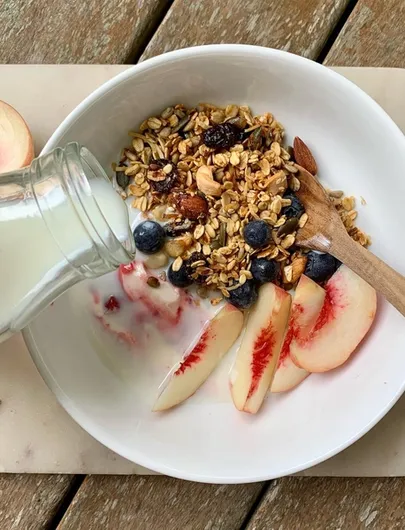Back
Choosing a healthy muesli at the supermarket can be an overwhelming experience! The shelves are filled with numerous options. In addition, one needs to navigate the ingredients, health benefit claims, nutritional labels and of course consider the cost. The following guide will assist you in making a healthier choice the next time you shop for muesli.
Supermarket muesli/granola often contains a variety of unhealthy ingredients - most commonly;
- Added sugars – e.g. sugar, fructose, honey, fruit juice concentrates and molasses.
- Added fats (“bad” fats) – listed as vegetable fats and vegetable oils.
- Salts.
- Refined ingredients (e.g. processed grains).
- Additives.
- Fillers (e.g. maize starch & modified starches).
Choose a muesli that has
- Whole grains (e.g. oats, rye, wheat, barley) - preferably listed as one of the first ingredients and thus making up the bulk of the product. Wholegrains are rich in antioxidants, minerals and fibre.
- A low sugar content – sugar is used as a binding agent, especially in granolas. Less than 5g /100g is ideal but this is difficult when the product contains dried fruit. Aim for 10g/100g or less. There are fruit-free mueslis on the market containing wholegrains, nuts and seeds.
- A low saturated fat content - whole grains, nuts & seeds provide “good” fats. Many mueslis contain added saturated fats (vegetable fats/vegetable oils) that are used to enhance the flavour. Ideally less than 3g/100g.
- A low salt content - ideally less than 120mg/100g.
- Fibre – this aids digestion, improves satiety (i.e. keeps you fuller for longer) and may assist with maintaining a healthy weight. Ideally 4g per 100g or more.
- No additives.
- No fillers (e.g. maize starch and modified starches).
- Untoasted has a lower sugar and fat content than toasted muesli/granola. Toasting denatures fatty acids.
- No fruit or only contains a small percentage of fruit (i.e. dried fruit is at the end of the ingredients list).
- A low glycaemic index.
- A few ingredients.
- Approximately 800kJ/serving.
Dried fruit and nuts provide extra protein, fibre, vitamins, minerals, antioxidants, flavour and texture to muesli. Nuts are also a rich source of omega-3 fatty acids.
Dried fruit is a fruit that has almost all the water content removed from it through drying processes. The fruit shrinks and transforms into small, energy-dense dried fruit. This concentrates all the sugar (glucose and fructose) and calories into a much smaller serving compared to fresh fruit and can cause problems when eaten in excess. About 22–51% of the sugar content in dried fruit is fructose. Consuming excess fructose may result in negative health effects such as an increased risk of weight gain, type 2 diabetes and heart disease.
By weight, dried fruit contains up to 3.5 times the fibre, vitamins and minerals of fresh fruit. Thus 1 serving can provide a large % of the RDI (recommended daily intake) of many vitamins (e.g. folate) and minerals folate. There are exceptions, e.g., the vitamin C content is significantly reduced when the fruit is dried.
Some fruit is coated with sugar or syrup before being dried. Always read the package when purchasing dried fruit and avoid brands that contain added sugar. Sulphites are sometimes added to dried fruit to preserve their colour. This may cause adverse effects in sensitive individuals. Dried fruit can be contaminated with fungi and toxins if it is incorrectly stored and handled.
The benefits of dried fruit are that it is rich in fibre, micronutrients and antioxidants (especially polyphenols).
- Polyphenol antioxidants are associated with health benefits such as improved blood flow, better digestive health, decreased oxidative damage and reduced risk of many diseases.
- Raisins are rich in fibre, potassium and other plant compounds. Eating raisins may improve blood sugar control, lower blood pressure and blood cholesterol and decrease inflammation.
- Prunes have a natural laxative effect because of their fibre and sorbitol content. They are also very filling and may help fight oxidative damage in the body.
- Dates are rich in antioxidants, potassium, iron and fibre. Eating dates may help reduce oxidative damage, moderate blood sugar and assist with labour in pregnant women.
- Always check the sugar content of the muesli on the nutritional panel.
- Portion control is also very important. A single portion size is 1/3 –1/2 cup of muesli served with some milk or yoghurt. You can opt for fruit-free muesli to limit your sugar intake.
- Always read the nutritional information on the packaging. Remember that the ingredients are listed in descending order of their percentage of the contents.
- Beware of the marketing claims on the front of the packaging. Analyse and compare it to the other brands on the shelves.
- Price does not always equate with quality.
- If you cannot find a healthy muesli that meets your dietary requirements – make your own at home. This allows you to control the nutritional content to suit your dietary requirements.
So, the next time you go shopping for muesli - take the time to read the nutritional information panel, compare brands and make the healthiest choice possible.
References
Product Review - Muesli Bars | Food and Nutrition Australia ı Dietitian Sydney ı Nutritionist Sydney ı Accredited ı Sydney CBD. 2018. Product Review - Muesli Bars | Food and Nutrition Australia ı Dietitian Sydney ı Nutritionist Sydney ı Accredited ı Sydney CBD. [ONLINE] Available at: http://www.foodnut.com.au/product-review-muesli-bars/w1/i1019349/. [Accessed 27 June 2018].
Healthline. 2018. Dried Fruit: Good or Bad? [ONLINE] Available at: https://www.healthline.com/nutrition/dried-fruit-good-or-bad#section7. [Accessed 02 July 2018].
The Healthy Mummy. 2018. Guide to buying the healthier muesli from the supermarket. [ONLINE] Available at: https://www.healthymummy.com/guide-to-buying-muesli/. [Accessed 02 July 2018].

